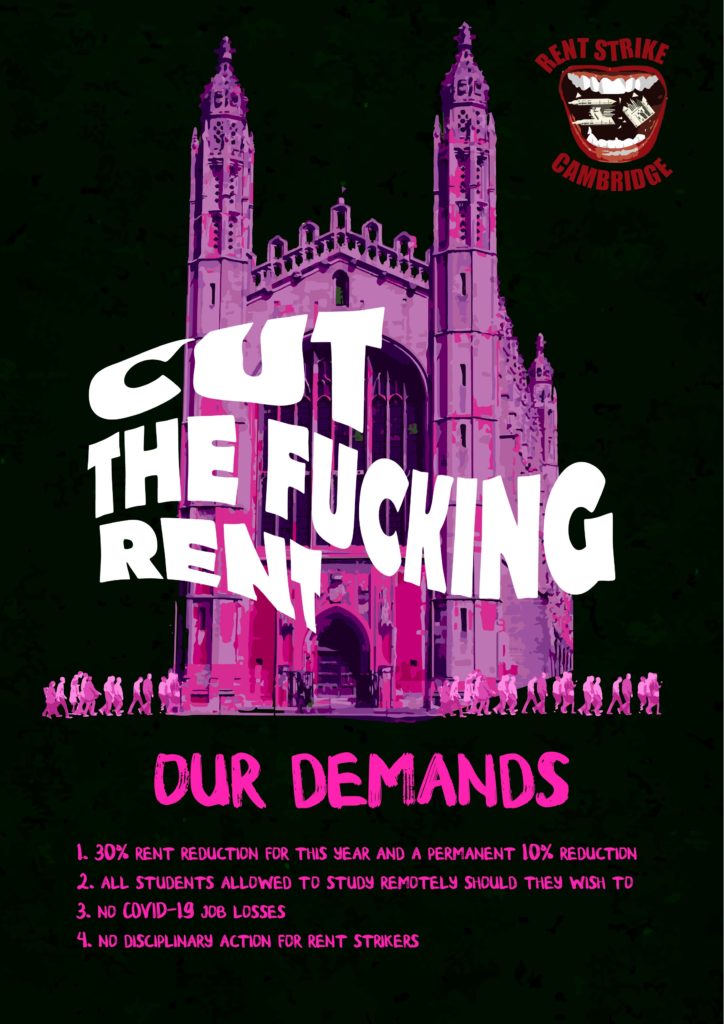
At the end of Michaelmas term a new student campaign group was set up, called ‘Rent Strike Cambridge’. The group associates itself with other rent strikes, such as the ones at the University of Manchester (UoM Rent Strike) and the University of Bristol (Bristol Rent Strike). Together these groups have also formed a national Rent Strike collective. At the college level in Cambridge, rent strike groups were also formed.
Dissatisfaction with the general attitude of both Cambridge University and their colleges in relation to financial, mental or covid-19 isolation support have caused Cambridge students to form these groups. The dismissal of the open letter of the International Students’ Campaign in an open meeting on 9 November with the Vice-Chancellor is a good example of this attitude. A widely-shared Facebook post on 7 January by Cambridge student Tara Choudhury, affiliated to the Rent Strike, puts to words this discontent (of going through the application for financial support): “You are made to feel in the debt of a generous benefactor rather than just getting to be someone who is completing a degree.” The Rent Strike also tries to question a widespread (implicit) assumption that colleges are ‘benevolent charities’. “What do you gain from insisting colleges are doing their best? How do you know that?”, writes Tara.
The announcement in emails by the Vice-Chancellor and Senior Tutors around 6 January that the University will not require students to be in residence for Lent caused the Rent Strike to shift their demands. Their first demands were: 1. A 30% rent reduction for the 20-21 year and a permanent 10% reduction; 2. All students should be allowed to study remotely should they wish to; 3. No covid-19 job losses and a reversal of the hiring and promotions freeze; 4. No disciplinary action against rent strikers. On 10 January their new demands were: 1. No detriment policies and all non-finalists should be allowed to proceed to their next year; 2. A 50% rent reduction for Lent and a 30% rent reduction for the 20-21 year; 3. No ‘keeping term’ requirement for the rest of the 20-21 year; 4. No disciplinary action against rent strikers; 5. No covid-19 job losses and a reversal of the hiring and promotions freeze. Because it was too short notice to organise a strike with these new demands, the central Rent Strike has decided to delay the strike until Easter term.

In addition to the anecdotal Facebook posts of the Rent Strike about degrading experiences students have been going through, it is worthwhile to put their dissatisfaction in further context of the Cambridge milieu. It is well documented that there is a strenuous relation between the University and colleges and financially less well-off students. Examples of this are a lack of support for ‘intermitting’ students and reports that receiving students are asked to write ‘thank you notes’ for college donors. In general, “[this has made] poor students feel like burdens”. The initially innocent looking discount for May Ball tickets for students who receive a Cambridge Bursary exemplifies a socio-economic divide in the Cambridge student population. As Tara writes: “There shouldn’t exist two groups of students at Cambridge: those who get to live their lives as normal and those that have to make a conscious decision to swallow their pride and beg […] or suffer in silence.”
Facing this, we should ask: why is this allowed to happen in Cambridge? What tells us this about the priorities of the University and the colleges? Why is there, for example, time and money instead for the University to participate in the UK government’s bureaucratic and counterproductive Research Excellence Framework (REF)? The REF has been broadly criticized for incentivising ‘impactful’ research at the expense of at least equally important, slow-coming research, whose importance cannot be measured by quantitative indicators. Despite this, so-called ‘Quality-Related’ funding from the UK government represents £127.0m out of £579.4m in research funding for the University in the 19-20 year. Where is this uncritical willingness to spend when it comes to student welfare? For more details on the influence of increasing bureaucracy in English higher education, see, for example, the essays published in the London Review of Books by Cambridge historian Stefan Collini and his book Speaking of Universities. For more financial details on marketisation in English higher education, see, for example, The Great University Gamble by Andrew McGettigan.
It is such questions that the Rent Strike alludes to when it explains its position not to campaign for fee rebates. “While we of course support calls to cancel tuition fees, (and for their abolition) our campaign is not and has never been a lobby group asking for a ‘product’ refund. This directly plays into the logic of marketisation,” they write on their Facebook page. Collini similarly warns, “[i]f students can be made to pay for what universities provide, then they acquire the rights of consumers and the government becomes, not their demonized oppressor or political antagonist, but their champion.”
However, it could be said that the Rent Strike has been struggling with their accuracy by statements such as ‘colleges display rent seeking behaviour’. Namely, students are an active part of the community that ‘makes’ a college. It would be more accurate to say that parts of certain college managements display behaviour that does not show a dignified consideration for their students. For their success, the Rent Strike should not resort to untargeted antagonism or give in to a transactional narrative that puts the students at the mercy of the colleges. Instead, it should be willing to reimagine and put forward how colleges can work for everyone.
In addition, due to the collegiate system present in Cambridge, the Rent Strike’s strategy has been to support essentially autonomous groups at each college, which poses a challenge in building university-wide solidarity. Yet, the intercollegiate wealth disparities and already existing schemes, such as the Colleges Fund, definitely justify a bigger focus on a university-wide campaign. The Colleges Fund collects and redistributes grants across colleges. Under this fund Lucy Cavendish and Hughes Hall both received an unrestricted grant of £920k in the 19-20 year. Recently, there have been calls for more redistribution across colleges.
Lastly, it is important to look at the successes of other student rent strikes in England. For example, the UoM and Bristol rent strikes have achieved rent rebates and reductions for (parts) of the 20-21 year (at Manchester a historically unprecedented £4mwas paid back to students), but both will continue to campaign for more rent rebates and reductions, as most students who did return in January did so out of a lack of access to an adequate place to study or even live. “Every student currently living within halls at Bristol University had a personal reason to brave the isolation and come back to Bristol. This may be due to unsafe conditions at home, financial instability, internet poverty or the fact they need to keep hold of their jobs in Bristol for survival,” writes one Bristol student. Similar issues have been raised by members of the Cambridge Rent Strike.
Going a few years back, the rent strike at University College London succeeded to secure more than £1m worth in rent freezes and new accommodation bursaries in 2017. Going back even further, at Cambridge, rent strikes in the 70s and 90s have achieved rent freezes and negotiation rights for the JCRs with respect to rent increases. In summary, “[the Rent Strike is] occurring in a context created by governments since the 1990s, and I hope that it will get students to be more conscious of that history and to become aware of the collective power they have to make things better,” as a student from King’s, affiliated to the Rent strike, says.
